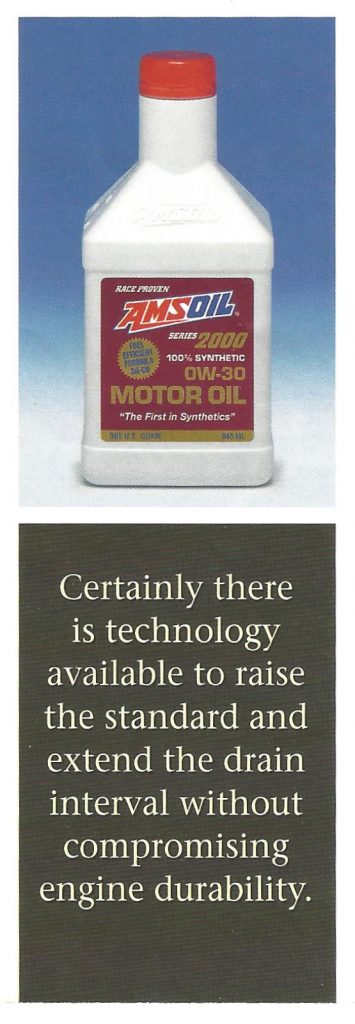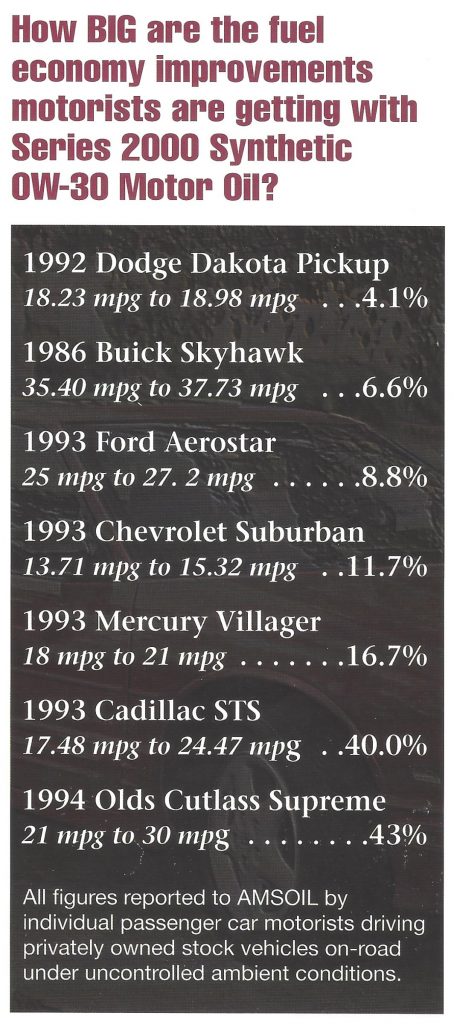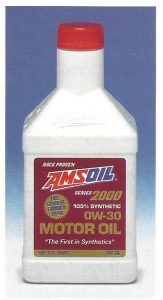AMSOIL has always been the leader in wear protection, fuel economy and extended drains. Now the Auto industry is placing these things as priorities. It’s about time.
“The price of a quart of oil in the U.S. is rarely over $1.25. At that price, oil companies don’t have much
incentive to buy more than a minimum level of additive treatment,” Chrysler’s Dennis Florkowski told
Lubes ‘N’ Greases (May 1996).
Perhaps price driven motor oil manufacturers don’t have much incentive to do more than the minimum.
But the motor oil industry’s quality leader, AMSOIL, certainly demonstrated its drive to maintain a com-
manding lead in quality product development during the past year with the introduction of the Series 2000 line of lubricants.
The unparalleled fuel economy, performance and engine protection afforded by Series 2000 motor oils, of course, comes from a tremendous investment of research and funds. “When a chemical company comes out with an expensive, premium product, they come to AMSOIL to sell it. They tell us no one else will touch it: too expensive,” says AMSOIL founder and CEO A.]. Amatuzio.
Ford Motor Company engineer Stefan Korcek agreed with Florkowski that ILSAC GF-2 oils were not as good as the automakers had wanted, citing fuel economy as the main disappointment. “We had to settle
for less than we wanted and, we believe, less than the oil industry had to offer.”
If the carmakers must accept average motor oil performance, they’ve got the right to be disappointed. But they certainly can’t complain that better performance isn’t available.
For example, AMSOIL Series 2000 Synthetic 0W-30 Motor Oil has taken fuel efficient motor oil to a new level. It recently received the highest test score ever recorded on the Sequence VI engine test for fuel efficiency at the independent lab where it was tested.

In addition to the fuel economy they feel they didn’t get with ILSAC GF-2, the automakers are looking to the next oil upgrade, ILSAC GF-3 (due by 2000 at latest) for extended oil drain intervals. General Motor’s Mike McMillan said, “Oil performance standards are minimum standards. Certainly there is technology available to raise the standard and extend the drain interval without compromising engine durability … Europe is already at a 9,000-mile drain interval and is seriously considering twice that.”
Currently, North American automakers’ drain interval recommendations are 5,000 miles or six months to 7,500 miles or one year. European guidelines, currently 9,000 and expected to double soon, seem high to the North Americans.
But the incredulity with which the 35,000 mile or one year drain intervals recommended by AMSOIL for Series 2000 oils doesn’t make the oils any less able to deliver on their long drain promise. It just means the auto industry will wait longer than it must for what it claims to want – and can have – now.
Speaking again of fuel economy, Florkowski said, “Additive technology that interacts with the new base oils, with synergism, can really enhance the performance of the overall package.”
AMSOIL Series 2000 motor oils demonstrate that truth. The technology in which AMSOIL invested thousands of hours and countless dollars has yielded an oil in which the basestock and additives produce an overall effect greater than the sum of the parts could produce.
More fuel economy and horsepower. Longer drain intervals. More engine protection. More of everything motorists and automakers want.
If fuel economy, long drain intervals and engine durability are what automakers want from the next generation of motor oils, then next-generation oils are here today. In fact, Series 2000 defines the performance standard for oils well into the next century.
The industry is finally coming around. Quality is finally an issue. Extended drain intervals – a term coined by A. ]. Amatuzio – is an issue. Always the leader in the lubricants industry, AMSOIL is where the
industry wants to be.
“Fabulous” Fuel Economy


“Most oil manufacturers use a quick-shearing viscosity index improver that helps their oil pass the test by allowing its viscosity to drop,” said the lab rep. “When the viscosity drops, intrafluid friction drops and fuel economy rises. But wear protection also drops. Of course, wear protection isn’t a concern in the Sequence VI test. Fuel economy is the only concern.”
AMSOIL insisted on using the shear-stable viscosity index improver – it was, after all, part and parcel of the oil’s formulation.
After testing, the independent test facility changed its tune. “The AMSOIL 0W-30 had a fabulous ECII pass in the Sequence VI,” remarked the tester in an interoffice memo. In fact, it was the highest Sequence VI score ever recorded by the facility.
Field Results Supportive
Reports from the field indicate that Series 2000 consistently gives users a fuel economy increase, with increases varying between four and 40 percent.
Many users also report their fuel economy continues to increase for an extended period after installation of Series 2000. For example, the user who reported an increase in mileage from 18 mpg to 21 (see table, next page) also reported that his mileage increased to 23, then 25 mpg with successive fuel fills.
In fact, the sheer number of unsolicited reports of increased fuel economy suggest that Series 2000 makes a very real difference.
No Compromise on Wear Protection
Reports from the field also consistently show the oil has outstanding friction reduction characteristics. Not only are users reporting fuel economy gains, they are also reporting their cars run quieter and more responsively. Some have also reported that they’ve had to reduce their engine idle speed.
Friction, of course, is a wear mechanism. Series 2000’s ability to reduce friction indicates an ability to also reduce the rate of engine wear. Indeed, Four-Ball Wear Testing bears out the assumption. Series 2000 Synthetic 0W-30 Motor Oil shows up to two times better wear protection than other top-selling oils do.

Finally, the friction-reducing ability of Series 2000 increases with time. That’s a crucial difference between Series 2000 and conventional fuel-efficient oils.
Conventional fuel-efficient oils combine a light viscosity basestock with a large volume of viscosity index improver chemistry. When the VI improver breaks down, as conventional ones do with use, the oil no longer supplies sufficient viscosity to prevent component contact during high temperature operations and wear occurs.
Not only does Series 2000 Synthetic 0W-30 Motor Oil incorporate shear-resistant viscosity index improver chemistry for ideal temperature-viscosity control, it also incorporates a unique wear-preventive chemistry that actually lays down a protective shield on component surfaces. The plating action protects engines during startup, challenging operations – anything a driver can dish out.
Compared to the hit-and-miss protection provided by conventional fuel-efficient oils formulated with fragile viscosity index improvers … well, there really is no comparison.
Series 2000 Synthetic 0W–30
Series 2000 Synthetic 0W-30 Motor Oil is formulated for use in passenger cars and makes a perfect replacement for 5W-30 and 10W-30 motor oils in all cars, including new cars under warranty.

Users from all regions have reported success with the oil. However, as a 0W-30, it offers users in cold regions an added benefit in cold temperature starting and cold temperature engine protection.
Finally, Cale Yarborough Motorsports, the NASCAR team spearheaded by the legendary racer, uses AMSOIL Series 2000 Synthetic 0W-30 Motor Oil to qualify for all the races of the 1996 Winston Cup, the ultimate tour of the NASCAR circuit.
That’s pretty tough service for an oil. Good thing they use Series 2000!
SLS Note: The industry is slowly coming around to the AMSOIL way of thinking. The requirements to certify oils are not only more detailed, the number and types of tests have been increased and it is now harder to pass the tests than it was 25 years ago. One example is the NOACK Volatility Test which AMSOIL was pushing to have included over 30 years ago. It took a long time but every auto manufacturer now recommends the use of synthetic motor oil and the oil companies are producing it although not always in the quality you should expect for a synthetic. Their biggest problem, AMSOIL was researching, developing and providing quality synthetic lubricants almost 50 years ago. So, take a look at the AMSOIL Catalog and see what the company has to offer. There is a good chance they have a quality synthetic lubricant for whatever application you have.
The Signature Series Lineup:
*All trademarked names and images are the property of their respective owners and may be registered marks in some countries. No affiliation or endorsement claim, express or implied, is made by their use. All products advertised here are developed by AMSOIL for the use in the application shown.
Reproduced With The Permission Of AMSOIL INC. All Rights Reserved.
For more information or pricing on the quality line of AMSOIL Products contact SLS Associates. Whether you are a Consumer, Retailer, or Commercial Business, we will answer your questions, explain any options and you take it from there. If you choose to try AMSOIL products we will give you our best price and you make the decision. No pressure. It’s your choice.
Click Here if you would like to browse the current AMSOIL Catalog
